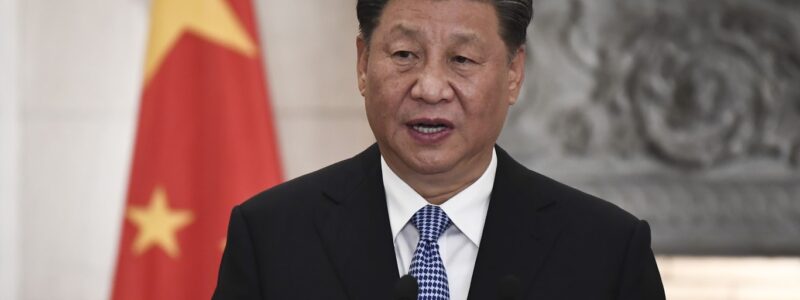
The Chinese president will visit France, Serbia and Hungary this week. His trip comes at a time of strained relations with many European countries over trade and allegations of Chinese espionage.
Chinese President Xi Jinping will visit Europe this week for the first time in five years, with stops in France, Serbia and Hungary.
Mr. Xi’s trip comes at a time of tension with many European countries over China’s support for Russia amid the war in Ukraine, its trade practices and apparent spying activities. The trip will also test Europe’s delicate balancing act between China and the United States.
Xi hopes to avert a trade war with the European Union as friction grows over Chinese electric car exports and reduced access for European companies to the Chinese market. Xi will also encourage French President Emmanuel Macron to seek greater autonomy from the United States in an effort to weaken Washington’s global dominance.
Here’s what we know about Mr. Xi’s trip, which began on Sunday.
What is the significance of Mr. Xi’s itinerary?
Experts say the three countries Mr. Xi will visit support, to varying degrees, China’s drive to overhaul the global order. All of them to varying degrees question America’s post-war world order and seek to strengthen ties with Beijing.
Hungary has close ties with China and is seeking to attract Chinese investment in areas such as electric cars and batteries as Chinese manufacturers expand beyond Asia. Serbia also has warm relations with Beijing and has attracted billions of dollars in Chinese investment.
Mr. Xi’s first stop will be France, where Mr. Macron recently declared that Europe “should never be a vassal of the United States” and turned France into a bridge between the Global South and Western powers.
Despite Beijing’s advances, Mr. Macron said he remains closer to his ally, the United States, than to China.
“I prefer to choose my relationship with the United States, with China, rather than have it imposed on me by one of the two parties that either pushes me one way or pulls me the other way,” he said in an interview with The Economist. However, he added. “It is quite clear that we are not equidistant. We are allies of the Americans.”
Before Mr. Xi’s visit, Chinese diplomats expressed hope that ties between France and China would take a leading role in China’s relations with the West.
Ursula von der Leyen, the president of the European Commission, the EU’s executive arm, will attend talks with Mr. Xi and Mr. Macron in Paris on Monday.
This year is also symbolic for China and the three countries.
It is the 60th anniversary of diplomatic relations between China and France and the 75th anniversary of diplomatic relations with Hungary.
This year also marks the 25th anniversary of the NATO bombing of the Chinese embassy in Belgrade, Serbia, during the Kosovo war, which killed three Chinese journalists and sparked angry protests outside the U.S. Embassy in Beijing. Chinese officials continue to point to the bombing as a sign of NATO aggression and an example of why Russia was right to feel threatened before deciding to invade Ukraine.
When was the last time Mr. Xi visited Europe?
Mr. Xi last visited Europe in 2019, before the coronavirus pandemic, after which he spent time in China, leaving the country’s borders for the first time in the fall of 2022.
The 2019 trip included a colorful ceremony in Rome to celebrate Italy’s participation in China’s Belt and Road global infrastructure project, which aims to expand China’s influence abroad. France rolled out the red carpet for Mr. Xi in Paris and signed more than a dozen commercial and government contracts worth billions of euros, though Mr. Macron warned that “China is playing on our differences” and that “the period of European naivete is over.”
Mr. Xi also visited Greece, where he pledged support for that country in its fight with Britain to obtain the Parthenon sculptures, known as the Elgin Marbles.
How are relations between Europe and China faring?
Since Mr. Xi’s last visit, there has been a growing rift in relations between China and much of Europe. The coronavirus pandemic, Beijing’s embrace of Russia and crackdown on ethnic minorities, and the surge in Chinese exports have sparked a backlash against China in many European countries.
China has quintupled its shipments of automobiles to foreign markets in recent years, and the European Union has recently taken a more confrontational stance toward China’s trade practices. EU authorities have launched an investigation that could lead to restrictions on Chinese solar panel exports and have taken preliminary steps to limit trade in Chinese goods including electric cars, wind turbines and medical devices.
Italy has also told China that it will no longer participate in its Belt and Road Initiative, and last month within a week, six people in Europe were charged with spying for China, indicating that European countries are stepping up measures to combat Chinese espionage.
At the same time, European countries have different views on how to engage with Beijing and capitalize on economic opportunities, and some fear the imposition of European tariffs.
Mr. Macron and German Chancellor Olaf Scholz also believe China’s influence will be crucial to ending the war in Ukraine.